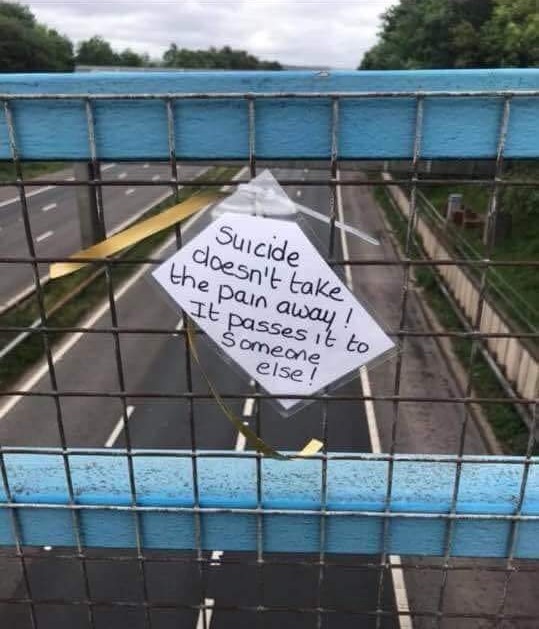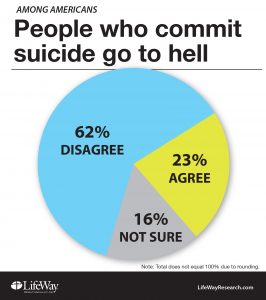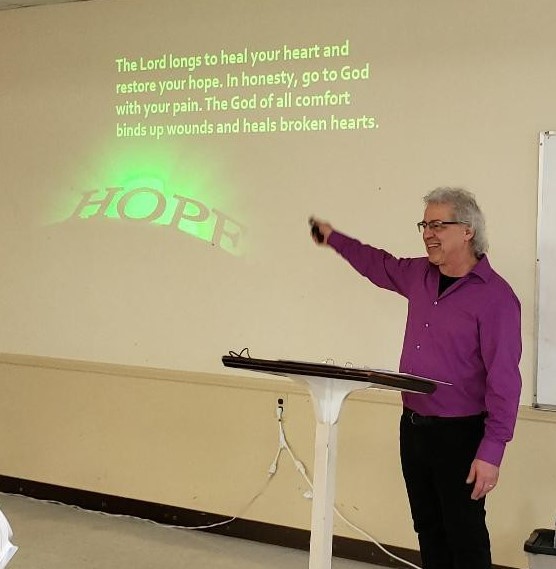RED ALERT!! Suicide deaths have reached epidemic proportions. The Center For Disease Control alarmingly reports suicide is the second leading cause of death in the U.S. for ages 10-34. It’s the fourth leading cause of death for ages 35-54. Tragic! Shocking! Real! Suicide knows no boundaries. It touches all ages, ethnic groups, genders, occupations, geographic areas, every level of society, the poor to rich. It’s invaded every community, the workplace, schools and even churches. A suicide death leaves devastating carnage along the roadside of the survivors of another’s suicide. People short-circuit emotionally. Hearts become shattered. Lives are turned upside down. Loss leads to a long road grieving towards recovery, wholeness and healing. Notes left behind often make no sense, only provide minimal closure and the “why?” question can haunt human minds for years. Perhaps, it’s invaded your life, family, friends or church?
 A 14-year-old Christian girl in a note to her mom wrote, “You kept asking me if I was okay and I kept telling you I was. But, I wasn’t OK. I’m sorry, mom. I’ve got too many problems. I’m taking the easy way out.”
A 14-year-old Christian girl in a note to her mom wrote, “You kept asking me if I was okay and I kept telling you I was. But, I wasn’t OK. I’m sorry, mom. I’ve got too many problems. I’m taking the easy way out.”
Could this precious life have been saved? Could this suicide have been prevented? Absolutely YES! Studies reveal there’s an 80-90% success rate of saving a life when a suicidal person receives help from a health professional, trained secular or Bible based counselor who can help bring hope and healing. However, as much success as doctors, psychologists, health professionals and counselors have, there is no guarantee a person will change their mind about taking their life.
Suicide is a conscious act, a deliberate act of self-induced annihilation, dying by your own hand because the pain you feel is greater than the pain of death. There’s no single cause to suicide. It most often occurs when the stresses people feel exceed their current ability to cope with ongoing, intolerable, high stress or pain. Toxic thoughts overwhelm their mind. They become deceived by their own wrong thoughts, by the assault of negative voices the scream words of hopelessness and death into them. They can hear voices telling them they should no longer be on this planet. The Bible says, “The thief’s purpose is to steal and kill and destroy.” (John 10:10)
I personally believe, for both Christian and non-Christian, the devil capitalizes on the insurmountable negative feelings, hurts, pain, stresses someone feels and influences the depressed person into convincing them death is the only way to escape, to take control and shut off the voices of pain to find peace.
Suicide is a selfish act. When a person chooses suicide, they’re not thinking about the people around them. They’re not thinking of the unspeakable pain that will be brought upon his or her loved ones for their entire lives. They’re only thinking about escaping the overwhelming pain they feel. Sadly, the pain is only passed on to someone else. I recognize all this can sound disturbing and depressing to some of you reading this. It’s real life, but there is hope. We’re all responsible to do what we can to reduce the risk of someone taking their own life. Suicides can be prevented if detected and acted on early enough.
Eight out of ten suicides show some warning signs. They can be subtle and well hidden by the suicidal individual, so well hidden, we may not recognize them. When they are that subtle or unrecognizable, we can struggle with feelings of guilt, blame or condemnation because we feel we failed to recognize the person was struggling.
There are many different factors that can lead someone to take their life. The most common is depression. It’s a massive problem in our society today. There’s no single  cause for depression. Brain chemistry, hormones, genetics, crisis and more may all play a role. When someone faces ongoing feelings of hopelessness, anxiety, feelings of being trapped in a life they can’t handle or manage, the relentless, continual pressures of the life they feel is beyond their current ability to cope. Depression can set in and sometimes, it leads to suicide.
cause for depression. Brain chemistry, hormones, genetics, crisis and more may all play a role. When someone faces ongoing feelings of hopelessness, anxiety, feelings of being trapped in a life they can’t handle or manage, the relentless, continual pressures of the life they feel is beyond their current ability to cope. Depression can set in and sometimes, it leads to suicide.
There are warning signs telling you it’s time to step in and intervene. For teenagers, some of the following signs are simply normal teenage behavior, but still be aware suicide may be on the horizon. Look for dramatic behavior and personality changes. They become a loner withdrawing from people. They show total disinterest in hobbies, pleasures they once enjoyed and give their prized possessions away. Academic progress deteriorates dramatically. They’ll act in reckless, violent, aggressive, risk-taking behaviors. Regular or consistent substance abuse develops. The need to punish themselves for some sin, mistake or failure leads to cutting themselves and they wear clothing to hide the scars.
Red flag warnings telling you to aggressively intervene include openly talking about death and suicide or talking about their plan. Verbally you’ll hear statements like, “You won’t have to worry about me any longer, I wish I were dead, you’re better off without me, I can’t go on any longer, nobody needs me, I just want to die, nothing matters, I’m going to kill myself.” When someone drops clues like these, your ears should perk up. Never, ever, take joking comments about suicide lightly! Don’t overlook warning signs. Don’t sound shocked.
If you recognize someone may be struggling with suicidal thoughts or contemplating suicide, it’s important to ask them questions. Do not back off. You may need to press them for answers. They MUST talk about their pain. Ask questions like, “What has been so painful that you want to die? What is making your life so unbearable? What has caused you to draw this drastic conclusion? How would you kill yourself? Do you have a plan? What happens if you fail?” Any verbal or written talk of ending life commands your immediate attention and action by seeking professional help right away!
Remain calm. Accept their feelings which are very real to them. Stay close to them and focus on the real issue or problem of suicide. Listen more. Talk less. Tell them how much you care, they aren’t alone, there is help available. Affirm their worth and value as a person to friends, family and to God. Pray with and for them out loud. Share God’s love for them and hope he offers. Offer to take them for help. Don’t hesitate to call 911 for help. Police are trained to deal with a suicidal person and for their own protection will take them for help. Stay with them until help arrives.
Don’t get caught up thinking you alone can help solve their problems or take the responsibility. Most always, a trained professional is most qualified to handle a suicidal person. It’s easy to become overwhelmed with their problems and even give the wrong help. Your speaking to them can help avert a suicide. Their mind may be screaming at them, but they will strain to hear you. Your speaking affirms your love and care for them, affirming their worth and value. Your speaking challenges their current state of mind. Don’t estimate the power of your words!
During my suicide seminars I am often asked, “If a Christian commits suicide, do they go to hell?” Perhaps, you know a Christian who ended their own life. In the last few years we’ve watched news media reports of even pastors committing suicide. Christians are not immune to depression, worry, anxiety, feelings of despair and hopelessness.
Where do true followers of Christ, Bible-believing, born again believers go after ending their life through suicide? In my research and studies nowhere does the Bible condemn suicide. I do not believe suicide is an unpardonable, unforgiveable sin. God forgives all sin … including suicide. In Mark 3:28-30, Jesus tells us what the unpardonable sin is. The only sin God cannot forgive is deliberately resisting God’s invitation to believe in His Son Jesus Christ, who died on the cross for the sins of all mankind. To live with an unbelieving heart that will not accept God’s love, mercy, forgiveness, rejecting God completely until death, ends all opportunity for them and the doors of heaven will be closed to them. It’s unbelief and rejecting Jesus that keeps you out of God’s presence.
If salvation depended upon confessing every sin we ever committed, nobody would qualify for heaven. We’ve all sinned in ways we fail to recognize, not aware of or not concerned enough about to confess. Jesus died and paid the penalty for all our sins, even suicide. Suicide is tragic. The carnage it leaves behind often brings pain and heartache to many. When a Christian commits suicide – it reflects upon God and can negatively affect how others see God BUT it is forgivable by God. Suicide victims who are children of God are redeemed souls in the presence of their heavenly Father.
God is a healing God. God is a God of hope to anyone who truly surrenders 100% of their life to him and allows him to bind up their wounds and heal their broken hearts and life. People in crisis, suffering loss, tragedy and any life struggle, must know the Lord longs to heal their heart and life. The cross proves everyone’s life is precious, valuable and matters to God. Salvation is about being made whole, spiritually, mentally, physically and emotionally. We as Christians, have the awesome privilege and responsibility to bring the love and comfort Jesus offers, expressed through us, into the lives of broken, hurting people all around us. You can be the loving arms of Jesus he can wrap around a struggling, hopeless, hurting, suicidal person, if you let him. You can help save a life!
Nick Costello is an evangelist/communicator/seminar speaker. He conducts informative, insightful suicide training seminars in churches and secular venues. Learn more at: www.nickcostello.org









